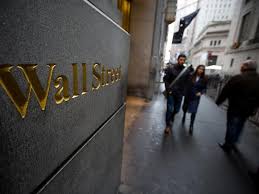Plunging Wall Street stocks end record bull run

Wall Street tanked on Thursday, slamming the book on the longest-ever U.S. bull market after new travel restrictions to curb the coronavirus spread spooked investors and rattled world markets.
President Donald Trump’s Europe travel ban, announced late Wednesday, sent all three major U.S. stock indexes into a tailspin, with the S&P 500 and the Nasdaq confirming their first bear market since the financial crisis.
The blue chip Dow suffered its worst one-day loss since October 1987’s “Black Monday.”
The benchmark S&P 500 and the Nasdaq have lost over a quarter of their value since reaching record closing highs just 16 sessions ago, as nations around the world grapple with how to contain the fast-moving coronavirus and its economic effects.
A bear market is confirmed when an index sinks 20% or more below its most recent closing high.
“The continued negative action in the market is telling us whatever’s been done so far hasn’t been enough,” said Joseph Sroka, chief investment officer at NovaPoint in Atlanta. “People can’t point to a tangible outcome that’s going to restore normal daily life, so uncertainty remains.
“Prominent organizations, educational institutions and even sports leagues are foregoing events out of caution,” Sroka added. “Leading institutions around the world are setting the tone. We’re cautious because they’re telling us to be cautious.”
Trump’s sweeping travel restrictions, limiting flights from continental Europe to the United States, sent European shares to a near four-year low and slammed airline stocks, already battered by the spread of COVID-19.
On Wall Street, airlines .SPCOMAIR plummeted 19.6%.
Boeing Co (BA.N) fell another 18.1% as J.P.Morgan abandoned its long-term backing for the company’s shares, setting the planemaker on course for its worst week ever.
The U.S. Federal Reserve is expected to cut interest rates for the second time this month at the conclusion of its two-day monetary policy scheduled for next week.
U.S. Treasury yields tumbled as anticipation grew for aggressive easing on the part of the Fed.
The New York Federal Reserve announced on Thursday that it would introduce $ 1.5 trillion in new repo operations this week.
“Any government action that has dollars tied to it that’s actionable for the banking system would be viewed as a positive,” Sroka said. “But what the market is looking for is tangible evidence that the government is trying to stave off a recession.”
Interest rate-sensitive bank shares .SPXBK dropped 10.5%, while corporate credit worries hit bond fund prices as companies began to draw on credit lines.
The CBOE Volatility index , a gauge of investor anxiety, shot up to levels not seen since November 2008, the height of the financial crisis.
The Trump travel ban also hit oil prices, sending front-month Brent crude down 8.6%. Oil prices were already under pressure after Saudi Arabia and Russia vowed to boost production, flooding the market with supply despite plummeting demand.
The S&P 500 Energy index .SPNY lost 12.3%
The Dow Jones Industrial Average .DJI fell 2,352.6 points, or 9.99%, to 21,200.62, the S&P 500 .SPX lost 260.74 points, or 9.51%, to 2,480.64 and the Nasdaq Composite .IXIC dropped 750.25 points, or 9.43%, to 7,201.80.
All 11 major sectors of the S&P 500 closed sharply lower.
Declining issues outnumbered advancing ones on the NYSE by a 23.77-to-1 ratio; on Nasdaq, a 17.69-to-1 ratio favored decliners.
The S&P 500 posted no new 52-week highs and 336 new lows; the Nasdaq Composite recorded 3 new highs and 1,573 new lows.
Volume on U.S. exchanges was 18.54 billion shares, compared with the 12.49 billion average over the last 20 trading days.

